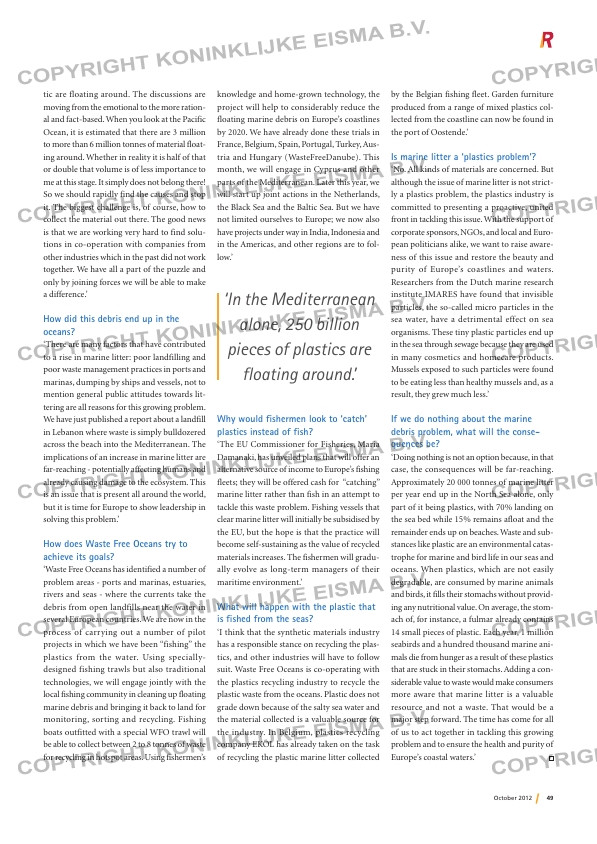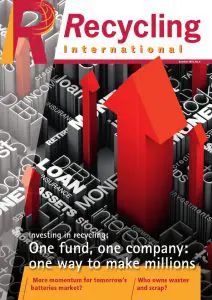Page 49 from: October 2012

49October 2012
tic are floating around. The discussions are
moving from the emotional to the more ration-
al and fact-based. When you look at the Pacific
Ocean, it is estimated that there are 3 million
to more than 6 million tonnes of material float-
ing around. Whether in reality it is half of that
or double that volume is of less importance to
me at this stage. It simply does not belong there!
So we should rapidly find the causes and stop
it. The biggest challenge is, of course, how to
collect the material out there. The good news
is that we are working very hard to find solu-
tions in co-operation with companies from
other industries which in the past did not work
together. We have all a part of the puzzle and
only by joining forces we will be able to make
a difference.’
How did this debris end up in the
oceans?
‘There are many factors that have contributed
to a rise in marine litter: poor landfilling and
poor waste management practices in ports and
marinas, dumping by ships and vessels, not to
mention general public attitudes towards lit-
tering are all reasons for this growing problem.
We have just published a report about a landfill
in Lebanon where waste is simply bulldozered
across the beach into the Mediterranean. The
implications of an increase in marine litter are
far-reaching – potentially affecting humans and
already causing damage to the ecosystem. This
is an issue that is present all around the world,
but it is time for Europe to show leadership in
solving this problem.’
How does Waste Free Oceans try to
achieve its goals?
‘Waste Free Oceans has identified a number of
problem areas – ports and marinas, estuaries,
rivers and seas – where the currents take the
debris from open landfills near the water in
several European countries. We are now in the
process of carrying out a number of pilot
projects in which we have been “fishing” the
plastics from the water. Using specially-
designed fishing trawls but also traditional
technologies, we will engage jointly with the
local fishing community in cleaning up floating
marine debris and bringing it back to land for
monitoring, sorting and recycling. Fishing
boats outfitted with a special WFO trawl will
be able to collect between 2 to 8 tonnes of waste
for recycling in hotspot areas. Using fishermen’s
knowledge and home-grown technology, the
project will help to considerably reduce the
floating marine debris on Europe’s coastlines
by 2020. We have already done these trials in
France, Belgium, Spain, Portugal, Turkey, Aus-
tria and Hungary (WasteFreeDanube). This
month, we will engage in Cyprus and other
parts of the Mediterranean. Later this year, we
will start up joint actions in the Netherlands,
the Black Sea and the Baltic Sea. But we have
not limited ourselves to Europe; we now also
have projects under way in India, Indonesia and
in the Americas, and other regions are to fol-
low.’
Why would fishermen look to ‘catch’
plastics instead of fish?
‘The EU Commissioner for Fisheries, Maria
Damanaki, has unveiled plans that will offer an
alternative source of income to Europe’s fishing
fleets; they will be offered cash for “catching”
marine litter rather than fish in an attempt to
tackle this waste problem. Fishing vessels that
clear marine litter will initially be subsidised by
the EU, but the hope is that the practice will
become self-sustaining as the value of recycled
materials increases. The fishermen will gradu-
ally evolve as long-term managers of their
maritime environment.’
What will happen with the plastic that
is fished from the seas?
‘I think that the synthetic materials industry
has a responsible stance on recycling the plas-
tics, and other industries will have to follow
suit. Waste Free Oceans is co-operating with
the plastics recycling industry to recycle the
plastic waste from the oceans. Plastic does not
grade down because of the salty sea water and
the material collected is a valuable source for
the industry. In Belgium, plastics recycling
company EKOL has already taken on the task
of recycling the plastic marine litter collected
by the Belgian fishing fleet. Garden furniture
produced from a range of mixed plastics col-
lected from the coastline can now be found in
the port of Oostende.’
Is marine litter a ‘plastics problem’?
‘No. All kinds of materials are concerned. But
although the issue of marine litter is not strict-
ly a plastics problem, the plastics industry is
committed to presenting a proactive, united
front in tackling this issue. With the support of
corporate sponsors, NGOs, and local and Euro-
pean politicians alike, we want to raise aware-
ness of this issue and restore the beauty and
purity of Europe’s coastlines and waters.
Researchers from the Dutch marine research
institute IMARES have found that invisible
particles, the so-called micro particles in the
sea water, have a detrimental effect on sea
organisms. These tiny plastic particles end up
in the sea through sewage because they are used
in many cosmetics and homecare products.
Mussels exposed to such particles were found
to be eating less than healthy mussels and, as a
result, they grew much less.’
If we do nothing about the marine
debris problem, what will the conse-
quences be?
‘Doing nothing is not an option because, in that
case, the consequences will be far-reaching.
Approximately 20 000 tonnes of marine litter
per year end up in the North Sea alone, only
part of it being plastics, with 70% landing on
the sea bed while 15% remains afloat and the
remainder ends up on beaches. Waste and sub-
stances like plastic are an environmental catas-
trophe for marine and bird life in our seas and
oceans. When plastics, which are not easily
degradable, are consumed by marine animals
and birds, it fills their stomachs without provid-
ing any nutritional value. On average, the stom-
ach of, for instance, a fulmar already contains
14 small pieces of plastic. Each year, 1 million
seabirds and a hundred thousand marine ani-
mals die from hunger as a result of these plastics
that are stuck in their stomachs. Adding a con-
siderable value to waste would make consumers
more aware that marine litter is a valuable
resource and not a waste. That would be a
major step forward. The time has come for all
of us to act together in tackling this growing
problem and to ensure the health and purity of
Europe’s coastal waters.’
‘In the Mediterranean
alone, 250 billion
pieces of plastics are
floating around.’
R _8- n i .indd 9 09-10-12 10: 2



